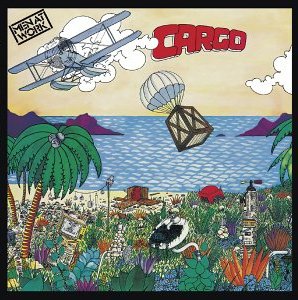
 Case No:
Case No: THDAMMXXII-XI/XXIII/07=16
Casefile:
Who? Men at Work
What? “Down Under”
Where? Australia
When? 1980
Sometimes a band just catches the zeitgeist, flourishes for a while and then everyone loses interest and off they go. Perhaps not into obscurity, but certainly in the public eye, no longer important or worth worrying about. It seems to me that Men at Work gained their fame through something which was noted in the episode of The Simpsons (yes, them again) where they went to Australia and an American diplomat noted that for a short while, Australia was in vogue, with films like
Crocodile Dundee and
Young Einstein catching the public’s attention, to say nothing of the return of Mad Max, the post-apocalyptic action hero who first made Australia cool, but that they (sn
iggers) thought it would last. Of course, it did not. Everyone kind of loves Australia, sure, even now - how can you not love such an easy-going, friendly country? - but to a large extent, nobody really cares about it now. Its time as a cultural phenomenon has passed. Everyone else has lost interest and moved on to other things.
https://www.youtube.com/watch?v=EeeBH294v6I
But Men at Work found their time right in the middle of that “sweet spot” of Australiana, if you will. Formed in 1978, it took a mere two years before their first major hit, "Who Can it Be Now?" taking them all the way to number one in the USA while their second made their name all across the world with the quirky “Down Under”. Both came from their debut album
Business as Usual, which you might (and I do) consider an odd title for your first outing, but there it is. The album sold tremendously well, reaching Platinum status in the UK and SIX TIMES Platinum in the US (that’s six million copies sold), strangely doing better than it did at home, where it only (!) sold 200,000 copies, certifying it as a paltry quadruple Platinum. Pfft. Hardly worth getting up in the morning for!
https://www.youtube.com/watch?v=RY7S6EgSlCI
It did equally well on both sides of the Atlantic - and indeed, the Pacific - hitting the number one spot in the UK, USA and back home Down Under - as well as Canada, New Zealand and, um, Norway, feeding into the Australian craze that was going on at the time, with even bands like Icehouse and Mental as Anything doing well in the charts, and again vanishing once the fad petered out. But Men at Work weren’t going down that easily. Well, yes they were, but not without a fight. Their second album,
Cargo, released in 1983, produced another hit single, “Overkill”, which, while it just barely failed to scrape into the top twenty in the UK, again hit the heights in the US, reaching no. 3, again oddly though, doing less well in their home territory, where it got to number five. The album itself did very well, taking the number 3 slot in the US, number 8 in the UK and of course the top spot back home. It certainly shifted the units too, going triple Platinum in both the US and Canada, Platinum in Australia but only Gold in the UK. It seemed, to use an obvious metaphor, the shine was beginning to wear off Men at Work.
Before we go into their history and demise though, let’s look at the controversy surrounding their biggest hit. It was assumed - certainly by me at any rate - that “Down Under” was a cheerful, somewhat irreverent song about Australia, but looking into the lyric reveals a darker undertone. According to the lyricist, frontman and singer Colin Hay, the song was about the Americanisation of Australia, its loss of cultural identity and the danger of its losing its history and individuality. This is, apparently, underlined in the video for the song by the members of the band carrying a coffin across the desert, signifying, so he says, the death of Australian culture. Well, who knew? The final lines in the chorus “Better run, better take cover” also refer to the threat to Australia from outside influences.
https://www.youtube.com/watch?v=SECVGN4Bsgg
As it goes, the song was not even meant to be a hit, having originally been released as the B-side of their first single, “Keypunch Operator”, which was recorded before they had a contract. Reminds me of the “mistake” hit when “Black Boys on the Corner” was released with “Whiskey in the Jar” on the B-side, and we all know that story! Unfortunately, greed and lawyers know no time limit, and in 2007 it was revealed - somewhat innocently, on a quiz show - that “Down Under” used part of the children’s song “Kookaburra” in its melody, leading to the awakening of the Selfish Giant, who decided that they needed to be paid, even though Larkin Music, who held the copyright of the 1932 (!) tune - its composer long dead - didn’t even know about its inclusion until they were alerted. Two years later the legal wheels were in motion, and after a protracted legal battle which ran for two years, Men at Work lost their case.
But what of the band behind the music? That’s, after all, what we’re here to discuss. Well, it seems success hit them rather harder than expected. Their manager was unable to deal with having to look after a suddenly global phenomenon, had no real experience in the record industry and some of the band members, perhaps not unreasonably, wanted him fired. He was, however, a friend of Hay, and instead the singer fired
them. Ouch. Their third album bombed utterly, released at a time when the world was beginning to wake from its love affair with Australia, roll over and shuffle its feet going “Christ is that the time? I have, uh, a meeting to go to” and desperately looking for the phone to call a taxi, wondering what the hell it had drunk last night?
The band soon broke up, but reformed in 1997 and toured, however it was clear this was a band who were going to survive on their reputation and flog their hits for all they were worth. They never recorded another album, and after the disastrous lawsuit over “Down Under/Kookaburra”, flautist Greg Ham died of a heart attack, Hay attributing his death to stress brought on by the case, which he also blamed for the death of his own father. Hay remains involved in music, but the death of Ham sounded the final knell for Men at Work. Although Hay put together various bands under that name, there were none of the original members (other than himself) in those bands and you can say he was just using the name. Men at Work had finally, it seemed, laid down their tools and, like good Australians and navvies everywhere, had knocked off and gone down the pub.